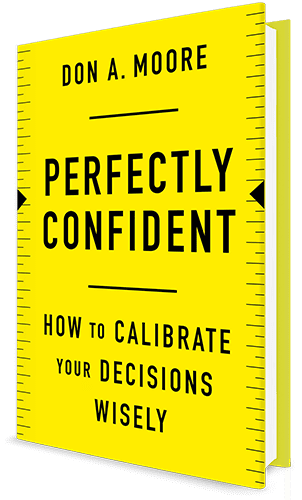Tips for calibrating your decisions wisely

Forget what you’ve read in self-help books. More confidence is not necessarily better, says Prof. Don Moore, who studies the psychology of decision-making and overconfidence.
His new book, Perfectly Confident: How to Calibrate Your Decisions Wisely (HarperCollins, 2020), uses studies from psychology and behavioral economics to explain what confidence is, when it can be helpful, and when it can be self-delusional and destructive. It’s a lively, self-aware guide—replete with anecdotes, scientific research, and provocative questions—that can help anyone find what Moore calls “the middle way between having too much and having too little” confidence.
“The middle way enables you to see the truth and understand all that you are capable of, and how to achieve it,” says Moore. “It helps you steer clear of mistakes that can put you at risk for missed opportunities, embarrassment, and pain.”
Moore lists five strategies for better calibrating your confidence.
- Avoid fooling yourself with wishful thinking. Don’t let your desire for something to happen bias your assessment of its probability. Moore suggests writing down your predicted outcomes and keeping score of results to improve your accuracy over time. The book includes a framework for doing so.
- Ask yourself why you might be wrong. Consider the opposite of your assumptions by holding a premortem analysis—writing down ways a project could fail—to temper your expectations and prepare for likely outcomes.
- Avoid being tricked by others’ displays of confidence. Confident entrepreneurs, such as Elon Musk, are often successful. But to view confidence as the reason for their success confuses correlation and causation. Avoid being duped by confident displays not backed by competence.
- Take the outside view. Consider rates of success among others like you. What would an objective observer recommend?
- Ask “Wanna bet?” Betting on what you believe will happen can calibrate the confidence of yourself and those around you. If another rational, well-informed person is willing to take the other side of the bet, ask yourself what they know that you don’t.
Tune in to the virtual launch party for Perfectly Confident on Tuesday, May 26, 5:30pm PST/8:30pm EST. The event features a short reading, some confidence-calibration games, and tips for better calibrating your confidence. Ask questions via YouTube chat: https://haas.org/youtube-perfectlyconfident.